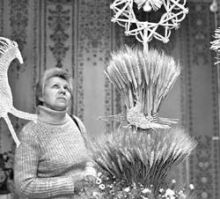The exhibition hall of the National League of Ukrainian Folk Art Masters offers a trip down memory lane, where visitors can admire the Ukrainian people’s ancient crafts and feast their eyes on the creations of folk masters from all over Ukraine. The exhibit, which ends on Dec. 2, features 500 of the finest works of folk art and was organized by the National League of Masters and the Ministry of Culture and Tourism. Visitors and the members of the jury have a marvelous opportunity to assess various types of folk art, such as beaded jewelry, embroidery, pottery, carpet-weaving, folk toys, folk attire, weaving, artistic wood— and metal-carving, and ceramics.
A STRAW WONDER
Maria Kravchuk, a professional artist from Volyn and Meritorious Art Master of Ukraine, long ago “betrayed” her main profession of painting. For more than 20 years she has devoted all her spare time to straw weaving. At first, weaving with rye straw was just a hobby, which later helped her win worldwide acclaim (Maria has participated many times in international exhibits of folk art and conducted master classes). To inspire other people to implement her creative ideas, Maria opened the Zhytechko Studio in her village.
“When I first saw a woven straw item, I was spellbound but at the same time I could not understand how you can work with this amazing natural material,” the master says. “Since I like working in the fields, I plant rye, harvest it, and then cut the straw. I reach the peak of my creative activity when I walk across the field, sniff a thousand smells from the grass, hear birds singing, and listen to the sounds of invisible creatures. All these thoughts contribute to my works.”
Kravchuk displayed her vision of a Christmas puppet show: a straw Father Christmas with flat people figures. She hit upon the idea of making flat figures, which is far more difficult than making three-dimensional ones, when she was making a beard for Father Christmas. The Christmas composition won first prize at Lviv’s Museum of Ideas.
KYIVAN RUS’ ON A PAINTED EGG
Gazing at the many exhibits, you cannot miss the brightly-painted Easter eggs that proudly stand on a kind of podium.
“Since I am thrilled by the culture of Kyivan Rus’, I often use the symbols from that era in my work,” says egg-painter Liubov Ktitorova. “Oak leaves symbolize the strength and stamina not only of the ancient Rusychi but also modern-day Ukrainians. Wreaths of oak leaves are often placed at the Eternal Flame on Victory Day. Numerous little crosses on painted eggs show the paganism of Kyivan Rus’ because each of them has trefoils, which symbolize the conception of new life and embody the male (the sun) and the female (earth) principle.”
Ktitorova differs from other egg masters by her use of natural dyes. Instead of the traditional aniline, which quickly fades in sunlight and loses its brightness, she uses tinctures made from various plants. She especially likes the leaves of lilac, fig tree, tansy, alder tree, and the bark of buckthorn. When you dip an egg into the dye, you can never guess what color it will be. Everything depends on the particular traits of the plant — on how much sun, moisture, and warmth it got while it was growing.
A KNOTTED CARPET
No folk art exhibit is complete without the works of folk weavers. These artisans use their own special techniques, but very few of them pay attention to long-forgotten methods of carpet making. Oleksandra Prokopenko from Lviv has always used the ancient knot-based technique known as kots (instead of braiding woolen threads from left to right and vice versa, with kots you have to tie the threads into knots, which create the design).
“It takes a lot of time to make a carpet like this — several months of daily work,” Prokopenko says. “First you must draw a sketch of the item and choose the required color range and only then get down to knotting.” A carpet woven according to the long-forgotten kots technique will never tear because the knots are tied to each other tightly. Today she has amassed a collection of about 20 carpets. She is handing down her skills to her grandchildren, with whom she wove “Danger” displayed at the exhibit.
The exhibit organizers are not sure they will be able to name the finest master in each type of traditional folk art because all the participants are talented and inimitable in their own way. In their works the master artisans tried to convey the special features and beauty of their small homeland — Volyn, Dnipropetrovsk region, Transcarpathia, the Kyiv, Lviv, Cherkasy and other regions of Ukraine.







